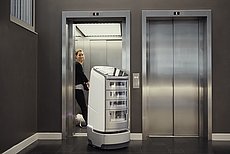Robots can now use lifts independently
Schmersal Böhnke + Partner to showcase new software API for service robots at interlift 2022
Bergisch Gladbach/Augsburg, 26 April 2022. The corona pandemic requires compliance with distance rules and the general shortage of staff creative automation solutions. Therefore, an increasing number of hotels and hospitals are now turning to service robots. Working in conjunction with Robotise AG, manufacturer of the service robot ‘Jeeves’, Schmersal Böhnke + Partner has now developed a software API (Application Programming Interface) that will allow Jeeves robots to use the lifts in hotels and other facilities fully independently.
Schmersal Böhnke + Partner will be showcasing the new software at interlift 2022 in Augsburg.
Robots undertake room service tasks in hotels, bringing guests chilled drinks, snacks and other items, or deliver warm meals to patients in hospitals. The new software API will allow service robots to use lifts independently, which significantly expands their range of movement in the various facilities.
The lift control software API communicates directly with the Jeeves Android cloud. If the Jeeves robot wants to use a lift, it is able to select a lift directly or request a lift within a lift group that is optimal for its particular use. The lift control then puts a lift car in priority mode for the Jeeves robot on the starting floor. Thanks to permanent communication with the lift control, the service robot is always aware of which lift car is available to it with its doors open for access. Once the robot has entered the lift car, the lift control knows which floor has been selected, and moves the lift car directly to that floor without stopping on other levels in between.
In situations in which a lift is unavailable for transport, perhaps due to maintenance work or temporary faults, this will be communicated to the service robot in real time, whereupon the service robot will leave the lift car in order to seek out an alternative.
Fire safety has also been built into the system: thanks to the flexibility of cloud communication in conjunction with the lift control, the robot is capable of dynamically adapting to the hotel’s fire safety concept. Operating states are forwarded to the service robot via the lift control, thus keeping the service robot informed of an ongoing fire evacuation. In that case, an automatic decision will be made – based on the instructions of the local fire service – as to whether the robot may enter the lift car or remain in the lift car.
‘Our development teams have created a very flexible piece of software that allows lift controls from Böhnke + Partner dating back to the early 2000s to be retrofitted with this software API,’ explains Dr. Andreas Hunscher, Head of Lift Business at the Schmersal Group. ‘As such, there are more than 30,000 lift controls currently in operation that can be equipped with this option. This really opens up the field of application for Jeeves robots.’
The International Federation of Robotics estimates that 2023 will see sales of professional service robots rise by 31 per cent to 537,000 units.
Visit Schmersal Böhnke + Partner between 26 and 29 April at interlift in Augsburg: Stand 1053, Hall 1
- Filbilagor:
- PM-Jeeves-Roboter-EN.pdf


